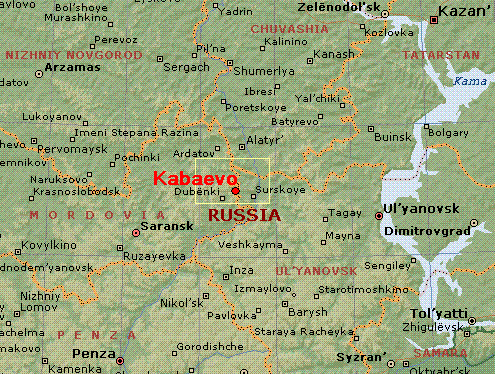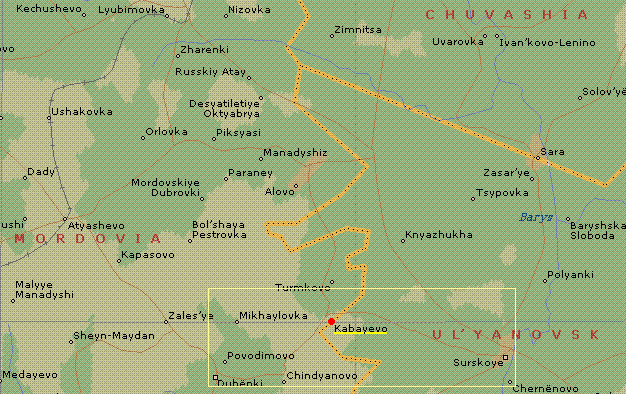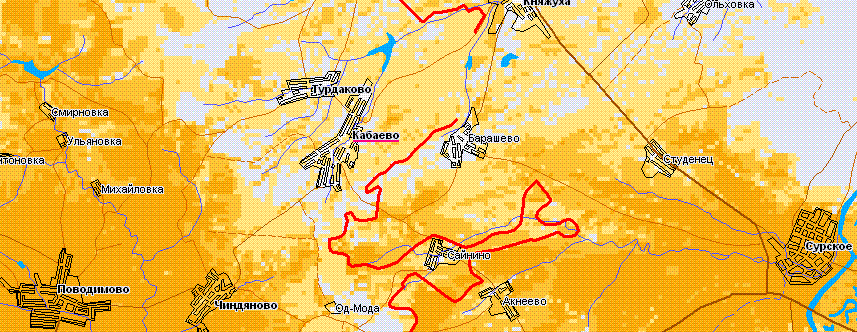Мордовский Вавилон
Первый
канал — 24.07.2004 |
Mordovian Babylon
Russian
TV Channel 1 — July 24, 2004
|
| Жители мордовского села
Кабаево — удивительный народ. На двух
деревенских улицах уживаются представители пяти разных религиозных
конфессий, яркие и запоминающиеся персонажи. |

|
Residents of the
Mordovian village Kabaevo*
are interesting people. On
two rural streets representatives of five different religious faiths
live together, who are impressive and memorable people.
[* Also spelled
Kabayevo, Mordoviya, Mordvinia,
Mordovian Republic, Republic of Mordovia,
Mordva Republic.]
|
|
See below:
|
|
История мордовского Вавилона — в
репортаже Алексея Громова.
|
The
history of Mordovian
Babylon, reported by Alexei Gromov. |
| Хором в Кабаево поют только
школьники на уроках музыки. Повзрослевшие
жители села, празднуют что-либо, всем миром крайне редко. Причиной
тому, различные религиозные убеждения односельчан — 600 жителей
маленькой деревни давно разделились на православных, баптистов,
пятидесятников, молокан и иудеев. |
Only school children sing in the
choir during music lessons. The adult residents of the village
rarely celebrate anything together. The reason for that
is the various religious beliefs of the fellows villagers — the 600
residents of this small
village for a long time were divided into Orthodox, Baptist,
Pentecostal, Molokan, and Jew.
|
| Случилось это еще в 20 годах
прошлого века, когда несколько кабаевцев
съездили на заработки в многонациональный город Баку. Вернулись домой
они — каждый со своей верой, в которую вскоре обратили и близких. Так
Кабаево превратилось в маленький Вавилон. |
This happened in the 1920s when
several residents of Kabaevo
went to work in the multinational city of Baku. Everyone returned home
with their own faith and soon converted their relatives' faiths. So
Kabaevo
turned into a small Babylon. |
| Мария Куманева, староста: "Они
же раньше все были православные. И
молокане, и баптисты, но по каким-то убеждениям из веры ушли. Ведь
церкви раньше в селе не было — надо же было людям куда-то идти |
Maria Kumaneva, the head of the
village, said: "Earlier everyone was Orthodox. Molokans and Baptists*
left the Orthodox faith for some reason. Before there was no Orthodox
Church in the village, so people needed to attend somewhere. [* Most Baptists in Central Russia were
originally Molokan. In fact the first Baptized Russian was the Molokan ]
|
Церковь в Кабаево отстроили
около года назад. Ряды православных в селе сразу заметно пополнились.
Впрочем, и до этого свои убеждения кабаевцы меняли не единожды.
|
A year ago an Orthodox Church
was built in Kabaevo. Immediately the number of Orthodox in the village
noticeably increased. However in the past, the beliefs of Kabaevo
residents changed
many times.
|
| Надежда Горюнова, учитель
Кабаевской школы: "Пятидесятники зовут к
себе, молокане к себе, так все и мечутся, и бросают веру. Говорят, что
это большой грех, но так многие и делают: сначала они молокане, потом
баптисты, потом пятидесятники". |
Nadezhda Goriunova, a Kabaevo
school teacher said: "Pentecostals invite everybody, Molokans invite
everybody, so they are all joining and leaving the faiths. People say
that it is a big sin, but so many do it: first they are Molokans, then
Baptists, then Pentecostals." |
| Чемпионом по смене
вероисповедания в Кабаево заслуженно считается
бывший дояр, а ныне пенсионер Дмитрий Зорькин. Рожденный в православии
дед Митя, еще в младые годы перешел в иудаизм и стал называть себя
евреем. К пенсии Дмитрий Васильевич стал пятидесятником. |
The deserved champion of
changing faiths in Kabaevo was an dairyman, now retired, the elder
Dmitry Zorkin. Grandfather Mitia
was born Orthodoxy, in his youth he converted to Judaism and
began to call himself a Jew. Upon retirement Dmitry Vasilevich became
Pentecostal. |
Теперь иудейская вера
представлена в Кабаево одним только семейством Моисея Демяшкина
называющего себя раввином. Но и тут, о чистоте иудаизма говорить не
приходится — жена раввина Анна Даниловна всю жизнь исповедует
православие, что не мешает им жить вместе почти 60 лет. Но троих
сыновей, несмотря на семейные споры, Моисей Евсеевич, со свойственным
ему упорством, обратил в иудаизм.
|
Now only one family in Kabaevo
is of the Judaic faith, the family of Moisei Demiashkin, who is the
Rabbi. But you cannot say that they are pure Jews. The wife of the
Rabbi, Anna Danilovna, was Orthodox all her life, but that did not
prevent them from living together for almost 60 years. Despite family
disputes, Moisei Evseevich was persistent and converted their three
sons to Judaism.
|
| Сыновья Демяшкиных чистоту веры,
тоже не сохранили — все женились на
представительницах других религий. И теперь уже их дети путаются в
своем вероисповедовании. |
Demiashkin's sons also did not
maintain a pure faith. All married members of other religions. And
already their children are
confused with their own faiths.
|
| И все же главное достоинство
кабаевцев — не многообразие вер, а
отсутствие конфликтов на религиозной почве. Жители села в один голос
утверждают, что стычек между разноверцами у них не было никогда. Здесь,
односельчане стараются исповедовать один принцип: "Не делай другому
того, чего себе не желаешь". Остальное, личное дело каждого. |
And still the main advantage
of Kabaevo residents is not the variety of beliefs, but the absence of
religious conflicts. Village residents unanimously say that they never
had skirmishes between members of the different faiths. Here fellow villagers try to
profess one principle: "Do not do
to another what you do not wish to be done to yourself." The rest is
their private
business. |
Where is
Kabaevo, Mordovia?
The Republic of Mordovia
is 217 mi (350 km)
southeast of Moscow on large plain crossed by the broad, shallow, often
swampy valley of the Moksha River in the west and the Sura, a direct
tributary of the Volga. Russia annexed the territory of the Mordovians
in 1552 when Ivan IV
("The Terrible") conquered the Kazan' Khanate.
The population in
1990 was 964,000: Russians 60%, Mordovians 33%, and Tatars 5%.
The
Russian word for Mordovians is Mordvy,
Мордвы. Mordovians are not ethnic Russians but part of a large group of
Finno-Ugric
people who live near the Volga River in central Russia. The
Mordovians
are divided into two independant main groupsof equal size, each
with their own language — Erzya mostly
spoken in the east and Moksha in the
west. The Molokans of Kabaevo probably speak Erzya because they live on
the eastern border.
|
Click
on maps below to ENLARGE.
|

Mordovia is 217 mi (350 km)
southeast of Moscow.
|

This map shows Kabaevo on
the east border of Mordovia |

Kabaevo is just
a few 100 feet from the border. |
Mordovian-Molokans
migrated to
Armenia, then America and Australia
Most Mordovian-Jumpers in America joined Big Church, Los
Angeles. Directly from Shorzha village migrated the families of Kostia
Iakovich Kudriashov, Ilya
Mikhailovich and Fenia Kudriashov,
David Ivanovich Golitsyn, Tolmachev (wife Fenya Livonovna
Kudriashov), Peter and Marina Telegin,
Grigoriy Maksimovich Kasymov,
Yemel'yan Kirillovich Kochergin,
Ivan Iakovlevich and Fenia Kochergin,
Moiseivich Kosyrev (father
Moisei), Lediaev, and Terenty Prokhorov. To Australia migreated
the families of Ivan Vasilievich and Tatiana Kasmynin, and Lediaev (wife: Anna Vasilievna
Kudriashov),
— "Родословие
молокан....поселок Надеждино (Шоржа)"
"This is a brief family history of Pavel Martin Lediev and their
forefathers. Starting with the great grandfathers, Dementi Harahcimich
and Metri Dementimich. Polaheya Ehnativna wife to Pavel Martin and
Nadia Celiverstivna wife of Metri Dementinich. Both couples were
of the sect* called Mordvy and lived in the rich region
called Mordovia which exists
today in Soviet Russia. The preaching of the truth by Uklein reached
them also." — Valoff Diary 1904:
Alex Joseph and
Tanya Andrew Valoff:
"Olden memories of our life, our birth, and life in mother Russia, and
our movement to America", page 65.
[* Mordovians were not
Orthodox, hence could be called a "sect". Actually they are ethnically
of a different origin than the Slavic Russians.]
|
